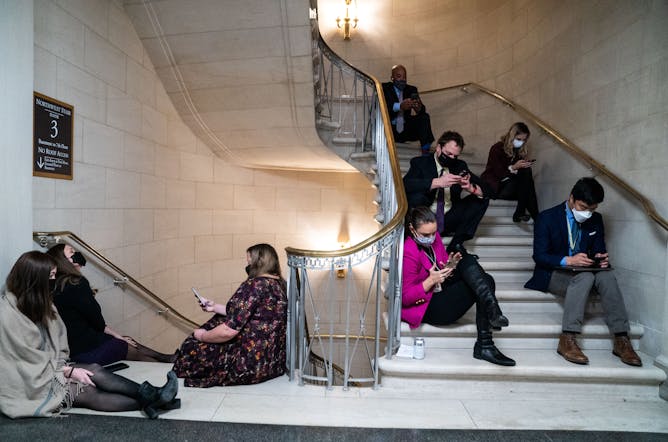|
Mention “scorecard” and my mind would probably turn to ballroom dancing or perhaps boxing. But not today. For it isn’t only pugilists and polka practitioners who have to wait for a (hopefully) neutral arbiter to deliver the right figures – politicians sometimes have to, as well.
Which brings me to the Congressional Budget Office, which has pledged to get its full “score” of President Biden’s Build Back Better legislation to Congress by Friday in a report that will analyze the proposal’s impact on revenue and spending. A lot depends on what the CBO says about how well the bill balances the books. A group of five Democrats have delayed voting on the US$1.75 trillion social spending bill until the CBO’s full verdict.
Philip Rocco at Marquette University explains how fiscal scorekeepers got to be so powerful in the halls of Congress, and how their reports have often been used for partisan reasons. He quotes Senator Chuck Grassley’s astute observation: “CBO is God around here … because policy lives and dies by CBO’s word.”
Also today:
|

You know they’re waiting, just anticipating … for CBO figures they don’t yet possess.
Kent Nishimura / Los Angeles Times via Getty Images
Philip Rocco, Marquette University
Five Democrats are refusing to vote on a signature bill until the Congressional Budget Office delivers its full cost estimate. For a small agency, the CBO can hold a lot of legislative sway.
|
Science + Technology
|
-
Anuraag Bukkuri, University of South Florida
Applying the principles of ecology and evolution could help oncologists anticipate cancer drug resistance and optimize their treatment plans for patients.
|
|
Politics + Society
|
-
Enrique Armijo, Elon University
Alex Jones lost a defamation suit by Sandy Hook parents for falsely claiming they helped fake the murders of their children. But the judgment doesn’t deal with important First Amendment questions.
-
Suat Cubukcu, American University; Erdal Tekin, American University; Nusret Sahin, Stockton University; Volkan Topalli, Georgia State University
Police body-worn cameras increase disciplinary action against officers and reduce racial bias against citizen complainants, according to a recent study.
-
William Thomas Mari, Louisiana State University
The decline of the news industry has been well documented. How did news organizations in the US heartland, facing potential extinction, survive – and even thrive – through the pandemic?
|
|
Education
|
-
Diana Leyva, University of Pittsburgh
Grocery shopping and family meals are prime opportunities to build reading and math skills – particularly for young Latino children, a new study finds.
|
|
Environment + Energy
|
-
Ashlee Abrantes, University of Washington
Salmon migrate thousands of miles from inland streams to the ocean and back. The newly enacted infrastructure bill includes funding to help salmon and other wild species on their way.
|
|
Economy + Business
|
-
Anna Nagurney, University of Massachusetts Amherst
As President Biden signs the bipartisan infrastructure bill, it’s important to determine which road, freight and information networks are the most vital to protect.
|
|
Health
|
-
Paddy Ssentongo, Penn State; Jennifer McCall-Hosenfeld, Penn State
The pandemic brought about a sharp rise in mental health concerns, deep unemployment and an unprecedented amount of social isolation – a potentially deadly combination alongside rising gun sales.
-
Fran Fleming-Milici, University of Connecticut
A new study looked at advertising and purchase data for children’s drinks and suggests that ads and pricing strategies contribute to sweetened children’s drink purchases.
|
|
From our international editions
|
-
Harriet Bowyer, Glasgow Caledonian University
One in three people struggle throughout the winter months with seasonal affective disorder.
-
Christi van der Westhuizen, Nelson Mandela University
FW de Klerk as National Party conservative was paradoxically the right leader at the right time to relinquish white minority rule.
-
David McCooey, Deakin University
Through 154 songs, Paul McCartney gives us an insight into his life. There is an elegaic feel to this book, which showcases the many sides to McCartney’s songwriting.
Today’s graphic

From the story, Organized crime is a top driver of global deforestation – along with beef, soy, palm oil and wood products
|
|